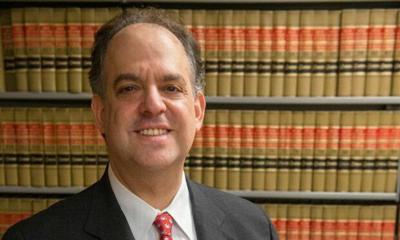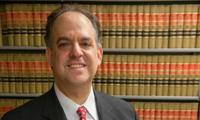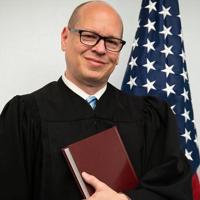
Attorney Ted Frank
A federal judge has put the brakes on claims from drivers who alleged they were “imprisoned” in their vehicles during a pro-Palestine demonstration that blocked the highway leading into O’Hare International Airport.
U.S. District Judge Mary Rowland issued an opinion Aug. 7 ending a lawsuit stemming from an Interstate 190 demonstration in April 2024. The legal action first landed in Chicago federal court in September 2024, when attorneys with the Hamilton Lincoln Law Institute, of Chicago and Indianapolis, filed suit against the activist organizations on behalf of named plaintiff Christopher Manhart, of Valparaiso, Indiana.
The named defendants include WESPAC Foundation, National Students for Justice in Palestine, Jewish Voice for Peace, Tides Center (which does business as the Community Justice Exchange), a group of dissenters identified in court filings as Organizational Defendants and four individual defendants: Jinan Chehade, identified as a primary organizer of the O'Hare blockade; Superior Murphy, who filmed the blockade; Rifqa Falaneh, identified as present of the SJP's DePaul University affiliate in Chicago and an organizer of the blockade; and Simone Tucker, identified as a JVP organizer and organizer of the blockade.
According to the complaint, the blockade was intended by the activists to not only disrupt traffic leading into the airport, but to maximize economic and societal disruption in an effort to protest Israeli military actions against Hamas in Gaza in response to the deadly October 7, 2023 terrorist attacks Hamas launched in Israel.
“These groups hoped that defendants, and those like them across the world, would draw attention to their cause by bringing economic centers to a halt,” the complaint said. “And on the I-190 expressway, the defendants succeeded, trapping thousands in their cars.”
In asking Rowland to dismiss the second amended complaint, filed at the end of January, defendants also requested sanctions against the plaintiffs and their attorneys for bringing what they called a “baseless” lawsuit intended to “intimidate advocates for Palestinian liberation into silence."
“In service of that goal, plaintiff asserts a private right of action where none exists, colors his time spent in traffic as akin to imprisonment and concocts a broad conspiracy to violate his rights based on little more than social media posts and his own information and belief,’ ” the defendants said. “All the while, the plain text of the complaint attempts to frame defendants’ advocacy as terrorism.”
Regarding false imprisonment, Rowland agreed that although the demonstration prevented cars from driving on I-190, drivers were not “confined” to their vehicles.
“The Second Restatement of Torts squarely addresses the factual situation before the court now,” Rowland wrote, quoting a passage that reads, in part, “one who blocks off a highway, intending to prevent the public from passing along it, is not liable for false imprisonment to one whose privilege to use the highway has been thus denied.”
The plaintiffs pointed to a 1985 Illinois Appellate Court ruling, Robinson v. Miller, and said that ruling established false imprisonment liability for blocking public roads. But Rowland labeled Robinson “an unpublished, 4-year-old decision” lacking “precedential or persuasive value” outside a few select areas.
“In Robinson, the plaintiffs were trapped on a 30-acre plot of wooded land that they owned and which was only accessible by a single dirt road after the defendants blocked the road with a locked chain and a truck,” Rowland wrote. “Unlike plaintiff here, who apparently saw several people get out of their cars and walk to their destination without interference, the Robinson defendants blocked the plaintiffs’ only path out of the area of confinement with a locked chain and barricaded it with a truck.”
Rowland said the fact cars appeared behind Manhart’s vehicle doesn’t add liability to demonstrators and said adopting his “reading requires believing that the drafters of the Restatement were unaware that a traffic jam might result from an obstructed highway and that travelers might be temporarily stuck in traffic as a result.” She also said Manhart conflated the concept of “no reasonable means of escape” as intrinsic to the imprisonment allegation when it is a separate inquiry from who committed the confining.
Although Manhart argued state law prevented him from leaving his car on the interstate, Rowland noted the Illinois Vehicle Code section he cited has a narrow definition of abandonment involving either disrepair or leaving a car for at least a week.
“The court does not doubt that plaintiff felt trapped in his car and in fact could not easily go where he wanted to,” Rowland wrote. “His frustrations were no doubt exacerbated because he was on the way to the airport. But to state claim for false imprisonment, the confinement must be ‘involuntary;’ it is not enough for a plaintiff to voluntarily remain in a place even if they believe they are justified in doing so.”
Rowland further noted longstanding common law principles “warn against plaintiff’s proposed expansion of false imprisonment.” She agreed with the defendants that Manhart couldn’t bring a complaint of “foreseeable injury caused by intentional breach of duty” in Illinois, but said she would consider that claim as a question of whether the defendants violated a public safety law. However, she said the Illinois Vehicle Code section Manhart cited seemingly addresses effective traffic movement, not public safety. Still, even taking Manhart’s position, Rowland said the count fails because the injuries he alleged don’t implicate public safety. She also declined to imply a right of action, saying state law precludes such a step.
Regarding a negligence claim, Rowland said Manhart couldn’t advance that strategy after already alleging intent on the part of demonstrators. She further disposed of claims for in-concert, aiding and abetting and conspiracy liability saying those could only survive along with his primary tortious conduct claims.
With respect to WESPAC, Manhart alleged it was NSJP’s “fiscal sponsor” and therefore bound to control its activities. But Rowland had already found NSJP wasn’t liable for any tortious conduct, automatically stripping potential liability from WESPAC.
Rowland sided with Manhart on the issue of standing to sue, noting the U.S. Seventh Circuit Court of Appeals has held loss of time is sufficient grounds. She denied as moot the defendants’ motions to strike certain allegations and also said the Illinois Citizen Participation Act can’t be used in a federal court to pursue sanctions for allegations of not stating a viable action.
“The court understands that this holding frustrates the important policy goals that the Illinois Legislature furthered in the ICPA and may encourage forum shopping,” Rowland wrote. “But neither concern alleviates the court’s obligation to follow Supreme Court precedent.”
However, she did grant motions for sanctions from individual defendants, dissenters and the Tides Centers under a federal court rule intended to deter baseless complaints. Rowland wrote she believed Manhart’s “filings were presented for the improper purpose of harassment and that plaintiff made legal contentions that were neither supported by existing law nor nonfrivolous arguments in favor of the extension or modification of existing law.”
She further said Manhart’s second amended complaint is “rife with allegations that are irrelevant to plaintiff’s stated causes of action and which are only a hair’s breadth away from calling defendants terrorists and placing the loss of innocent lives at their feet.” She said the larger context of the complaint, some of the work it cited and a request for $36 million for a putative class indicated the “intent in bringing this action was not to recover the damages actually sustained, but instead to harass.”
Rowland singled out Manhart’s legal representation for actions that “forced defendants to spend time and money shadowboxing a myriad of possible arguments to support a legal theory that plaintiff was not able to sufficiently articulate himself” and, while appreciating that attorney Ted Frank “has a genuine and personal concern” with the alleged conduct, Manhart didn’t have “carte blanche to make frivolous legal arguments, ignore controlling precedent, and misrepresent existing law in support of his case.”
Manhart will not be able to further amend his complaint.
The organizations and individual defendants are represented by attorneys Sheila A. Bedi, of the Community Justice & Civil Rights Clinic at Northwestern University; Megan Porter; Amanda S. Yarusso; Precious S. Jacobs-Perry and Ali I. Alsarraf, of Jenner & Block, of Chicago; Nora Snyder and Brad Thomson, of the People’s Law Office, of Chicago; and Hanna Chandoo and Dan Stormer, of Hadsell Stormer Renick & Dai, of Pasadena, California.




